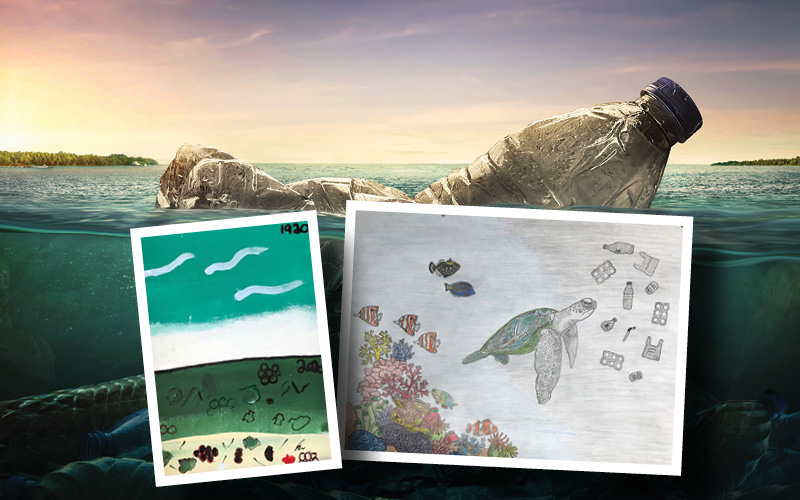Volume 1: Issue 2
By: Lila and Ava, sisters, ages 10 and 14, MI
 Lila:
Lila:
Water pollution is a huge problem in our oceans and lakes. Many kids don’t think they can do anything to help. But you can do a lot to help the environment!
Large cruise ships are dumping millions of pieces of trash in the ocean each year. You can reach out to big organizations and the government and ask them to force cruise ships to stop this tragedy.
And when you leave your plastic water bottles on the beach, you are putting harmful chemicals in the ocean waters where beautiful sea creatures live. Pick up your trash and other people’s trash off the beach and recycle it.
If we all do our part to help, our waters will be clean and healthy again.
*Lila’s artwork compares Earth’s oceans in 1920 and in 2020.
 Ava:
Ava:
Every time you leave a piece of trash somewhere, first think of the damage you’ll do. Now that little action turned into a big deal.
It’s simple. That trash you’re about to leave outside will cross an animal off the healthy, living list.
One day, if we don’t work to stop the damage we’re doing, Earth will be ruined—all because we didn’t care enough about the future to change our bad behaviors.
Don’t forget that when you leave that piece of trash in nature, it doesn’t just disappear!
*Ava’s artwork shows the vibrant colors and creatures of our ocean without trash and compares it to the dull and dying ocean ecosystem created by dumping trash.
Thematically, I thought it was neat how both Ava and Lila linked their artwork together to show the degradation of bodies of water over time. I found the gradient from a colorful healthy ocean to one that is gray and lifeless alarming and illustrative of the state of our planet. To paraphrase from Paul Hawken’s book, The Ecology of Commerce, humans have evolved to avoid the thought of waste. Industrial society parallels this behavior. To be clear, this mirroring of human behavior does not excuse big corporations for their decisions, especially when it comes at the expense of other people’s health. When we dispose of industrial waste, we put it in someone else’s environment.
Both girls touch on the idea that trash does simply not disappear but stays in the environment. I would like to take this message a step further. Even when we do pick up our trash, it ends up in the ocean. We operate in a system that is linear, or one where products are not recycled or waste is not designed to be part of the natural biological cycle. I would encourage everyone to look at circular waste and circular economies as they learn more about the waste cycle.
—Margaux Escutin, Environmental activist, Durham, NC









Lila and Ava, I have enjoyed wonderful bodies of water in Michigan, from small lakes to Lake Michigan. The clear water in all these locations, as well as the oceans, is so important to protect. Please keep speaking out about this.